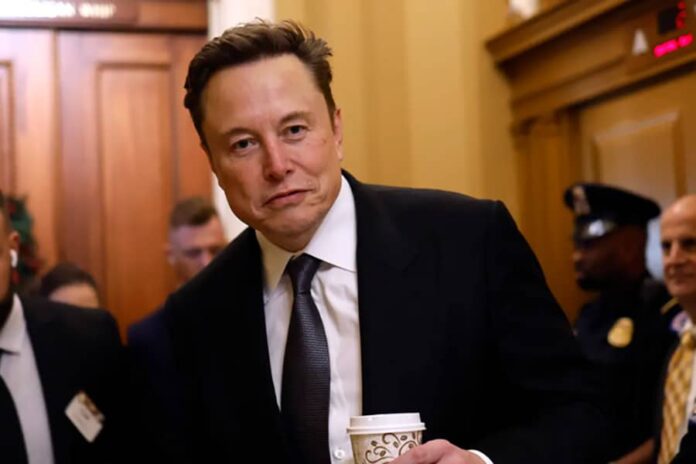The European Commission is looking into whether X is giving an unfair advantage to the far right in the upcoming German elections. So, what’s taking Brussels so long?
Elon Musk’s choice to host a livestream with German far-right leader Alice Weidel on X has stirred up quite a bit of anger among EU leaders and lawmakers.
They’re calling on Brussels to take strong action against the billionaire tech mogul. The European Commission responded by saying that Musk, who’s also linked to the incoming Trump administration, could face legal consequences under the EU’s new digital regulations, depending on how much his livestream is perceived as favoring Weidel over her competitors ahead of Germany’s election on February 23.
Across Europe, collaborating with Weidel is raising eyebrows since her party, Alternative for Germany (AfD), has been criticized for downplaying Nazi atrocities for years.
Right now, they’re polling in second place. French President Emmanuel Macron didn’t hold back, accusing Musk of crossing a line with his support for the AfD.
He remarked at a speech in the Elysée Palace that it’s hard to believe that just ten years ago we wouldn’t have imagined someone like Musk backing such a reactionary movement and directly influencing elections in places like Germany.
Now it’s up to the European Commission to act since they’re responsible for enforcing Europe’s Digital Services Act. This law regulates social media platforms like X and includes hefty penalties—up to 6% of global revenue or even temporary bans—for any violations.
Unequal benefit
Musk is facing a pretty significant legal issue under the Digital Services Act (DSA), and it’s not just about the content itself. The real concern is how much exposure on a massive platform like X could give the AfD an unfair edge over its competitors ahead of an election.
Thierry Breton, the former EU digital enforcer, pointed out that Alice Weidel would gain a considerable advantage thanks to Musk and reminded him to stick to his obligations under EU social media laws.
German Greens lawmaker Alexandra Geese put it this way: while Musk talking with AfD leader Weidel on X falls under freedom of expression, his algorithmic tweaks that flood German timelines with far-right messages while drowning out progressive voices? That’s another story.
When asked if Musk could be unfairly promoting Weidel’s agenda during Thursday’s livestream, Commission spokesperson Thomas Regnier highlighted that big platforms have a special responsibility when it comes to content that might affect elections. He mentioned they’d be closely monitoring how much content gets boosted.
Regnier also noted that Brussels has been keeping tabs on X’s compliance with the DSA for over a year now, and there’s a roundtable scheduled for January 24 where the Commission, German regulators, and X will discuss potential risks related to the upcoming February election.
It seems like there’s been some tension between Brussels and Musk already; Breton even got sent a meme from him telling him to f*** your own face. Quite the relationship!
The determination to take action in politics.
Taking legal action against a big tech mogul like Musk is already a complicated situation, but it gets even messier for the EU because in just 13 days, he’ll be stepping into a role in the U.S. government as the head of the Department of Government Efficiency.
According to Marietje Schaake, a former member of the European Parliament and Stanford fellow, Musk will essentially represent the U.S. president when he goes up against the leadership of key European allies.
This puts the EU in a tough spot; if they threaten investigations or fines, they could end up clashing with Washington. Felix Kartte from Germany’s Mercator Foundation mentioned that whether or not the EU Commission decides to take action will hinge on both solid evidence and political motivation.
The real question is if EU leaders are ready to confront Trump’s administration before it officially starts.
Despite these political considerations, Kartte believes there might still be grounds for holding Musk accountable. If his high-profile presence leads to public issues—like promoting illegal hate speech or harming media diversity—regulators could argue that his platform X isn’t meeting its risk management responsibilities under the DSA (Digital Services Act).
Some members of the European Parliament are also urging Brussels to investigate if Musk’s actions comply with this legislation.
For instance, German lawmaker Damian Boeselager raised concerns about whether Musk is using his platform in ways that could potentially restrict others’ freedom of speech by tweaking algorithms for his own advantage.
Essentially, he’s trying to find out if Musk is manipulating his own large platform in ways that might undermine free expression for everyone else by giving himself an unfair boost.
Some lawmakers are raising eyebrows about how Musk is using X to boost his own profile, and they’re calling on Brussels to look into it. Now, the responsibility of enforcing the DSA is in Virkkunen’s hands since he took over from Breton after he stepped down last summer.
Breton had already faced some resistance from his EU colleagues when he sent a letter to Musk, cautioning him about the potential fallout from promoting certain individuals or groups.
Even though Breton has left Brussels, he’s not staying silent about Musk. In fact, he’s recently issued another warning to both Weidel and Musk regarding their upcoming livestream, reminding them that they need to fully comply with EU regulations on the platform.
